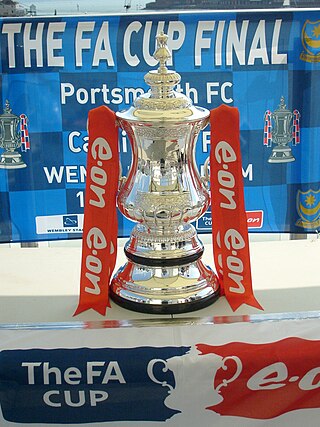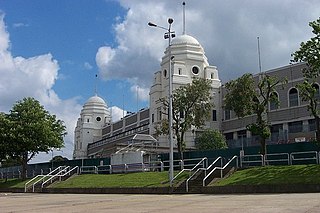1840s – 1850s – 1860s – 1870s – 1880s – 1890s – 1900s – 1910s – 1920s – 1930s – 1940s – 1950s – 1960s – 1970s – 1980s – 1990s – 2000s – 2010s – 2020s
The 1969–70 season was the 90th season of competitive football in England.

Anthony Brown is an English former footballer who played as a wing half and an inside forward. He was often referred to by his nickname Bomber or Bomber Brown and was known for his spectacular goals. He joined West Bromwich Albion as a youth in 1961 and turned professional in 1963. In the late 1960s and early 1970s Brown was part of an Albion team that built a reputation as a successful cup side, winning the 1966 Football League Cup Final and the 1968 FA Cup Final and finishing as runners-up in the League Cup in 1967 and 1970. He was the top scorer in Division One in 1970–71 and received his only England cap at the end of that season.
The 1965–66 season was the 86th season of competitive football in England.

The 1969 FA Cup final was the final match of the 1968–69 staging of English football's primary cup competition, the Football Association Challenge Cup, better known as the FA Cup. The match was contested between Leicester City and Manchester City at Wembley Stadium in London on Saturday 26 April 1969. This was the first FA Cup final since 1951 to take place in the month of April. Three-time winners Manchester City were appearing in their seventh final, whereas Leicester City were seeking to win the competition for the first time, having lost three previous finals.

The 1967 Football League Cup Final was an association football match between Queens Park Rangers (QPR) and West Bromwich Albion on 4 March 1967 at Wembley Stadium, London. It was the final match of the 1966–67 Football League Cup, the seventh season of the Football League Cup, a football competition for the teams in The Football League. This was the first final to be decided over a single game; the six previous finals were contested over two legs. QPR were appearing in their first final, while Albion were appearing in their second after winning the previous final in 1966.

The 1954 FA Cup final was a football match between West Bromwich Albion and Preston North End, played on 1 May 1954 at the original Wembley Stadium in London. It was the final match of the 1953–54 staging of English football's primary cup competition, the Football Association Challenge Cup. The match was the 73rd FA Cup Final and the 26th to be played at Wembley.

The 1968 FA Cup final was the 87th final of the FA Cup. It took place on 18 May 1968 at Wembley Stadium and was contested between West Bromwich Albion and Everton.

The 2007–08 FA Cup was the 127th season of the world's oldest football knockout competition, the FA Cup. A record 731 clubs' entries were accepted for the competition.

The 1976 Football League Cup Final took place between Manchester City and Newcastle United on 28 February 1976 at Wembley Stadium. It was the sixteenth final and the tenth Football League Cup final to be played at Wembley. Manchester City won the match 2–1 to win the competition for the second time. The match is best known for its winning goal, an overhead kick by Dennis Tueart.

The 2007 Football League Championship play-off final was an association football match which was played on 28 May 2007 at Wembley Stadium, London, between Derby County and West Bromwich Albion. The match was to determine the third and final team to gain promotion from the Football League Championship, the second tier of English football, to the Premier League. The top two teams of the 2006–07 Football League Championship season gained automatic promotion to the Premier League, while the clubs placed from third to sixth place in the table partook in play-off semi-finals; Derby County ended the season in third position while West Bromwich Albion finished fourth. The winners of these semi-finals competed for the final place for the 2007–08 season in the Premier League. Winning the game was estimated to be worth up to £60 million to the successful team.
The history of the FA Cup in association football dates back to 1871–72. Aside from suspensions during the First and Second World Wars, the competition has been played every year since.
The 1992–93 FA Cup was the 112th season of the FA Cup, also known as The Football Association Challenge Cup. It was won by Arsenal, who beat Sheffield Wednesday 2–1 in the replay after a 1–1 draw in the final at the old Wembley Stadium. The goals were scored by Ian Wright and Andy Linighan, who scored in the 119th minute. This was the last FA Cup final to be decided by a replay before final replays were abolished in 1999.
The 1993–94 FA Cup was the 113th staging of the world and England's oldest cup competition, the Football Association Cup or FA Cup. The competition overall was won by Manchester United for the first time since 1990, with a 4–0 thrashing of Chelsea.
The 1930–31 FA Cup was the 56th staging of the world's oldest football cup competition, the Football Association Challenge Cup, commonly known as the FA Cup. West Bromwich Albion of the Football League Second Division won the competition, beating First Division team Birmingham 2–1 in the final at Wembley, London. In doing so Albion became the first and to date only club to both win the cup and gain promotion in the same year.
The 1922–23 FA Cup was the 48th season of the world's oldest association football competition, the Football Association Challenge Cup. Bolton Wanderers won the competition, beating West Ham United 2–0 in the first final to be held at Wembley Stadium, London.

The 1993 Football League Second Division play-off final was a football match played on 30 May 1993 at Wembley Stadium, London, between Port Vale and West Bromwich Albion to determine the third and final team to gain promotion from the Second Division to the First Division. The top two teams of the 1992–93 Football League Second Division season gained automatic promotion to the First Division, while those placed from third to sixth place in the table took part in play-offs; the winners of the play-off semi-finals competed for the final place for the 1993–94 season in the First Division.
The 1966–67 Football League Cup was the seventh season of the Football League Cup, a knockout competition for England's top 92 football clubs. The competition started on 23 August 1966 and ended with the final on 4 March 1967. This was the first season during which Arsenal, Tottenham Hotspur, and Wolverhampton participated in the League Cup; Everton and Liverpool were the only League teams that did not compete.
The 1969–70 Football League Cup was the tenth season of the Football League Cup, a knockout competition for England's top 92 football clubs. The competition started on 12 August 1969 and ended with the final on 7 March 1970.







